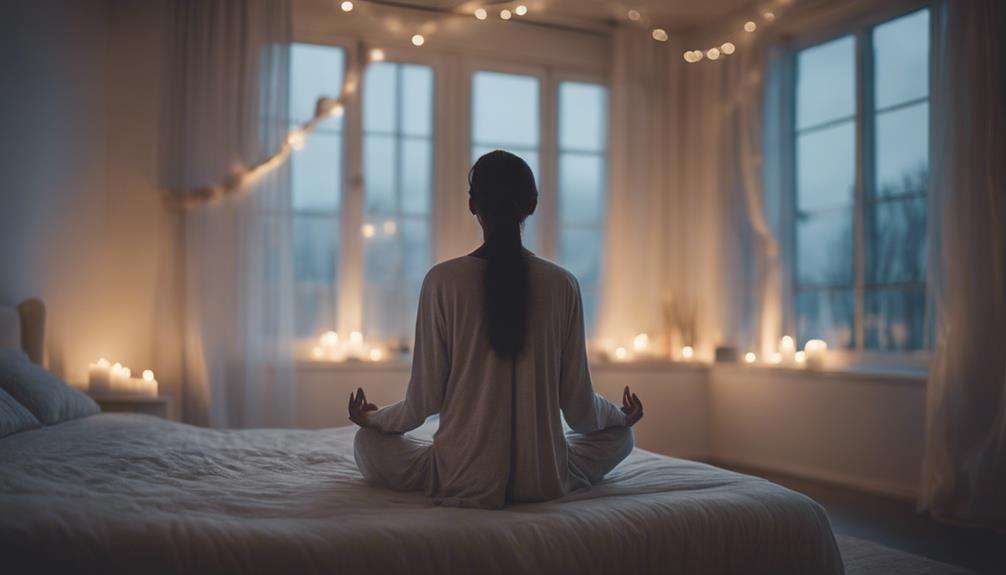As you navigate the bustling seas of your day, finding the shores of tranquility before sleep can feel like searching for a hidden treasure map. But fear not, for within the realm of relaxation techniques lies a compass to guide you.
Imagine a world where your mind drifts effortlessly into slumber, free from the turbulence of the day. A place where your thoughts gently dissolve like sugar in warm tea, allowing you to sink into peaceful rest.
Join us on this journey through ten ways to quiet your mind before the sandman's visit, and discover the key to unlocking serene nights.
Key Takeaways
- Practice deep breathing techniques with extended exhales for relaxation before sleep
- Engage in mindfulness meditation to center thoughts and promote calmness
- Use visualization exercises to create a tranquil mental space for better sleep
- Establish a worry-free routine by allocating specific worry time and writing down tasks for the next day
Deep Breathing Techniques
Before you drift off to sleep, practicing deep breathing techniques can help calm your mind and prepare your body for a restful night. Deep breathing involves focusing on relaxing the diaphragm, emphasizing soft inhales, and extended exhales. This controlled breathing isn't just about filling your lungs with air; it's a method to slow your heart rate, reduce blood pressure, and stimulate the rest and digest system. By incorporating deep breathing into your bedtime routine, you can effectively promote relaxation and sleep readiness.
Emphasizing soft inhales and extended exhales during deep breathing helps in calming the mind, reducing muscle tension, and improving the quality of your sleep. Research shows that deep breathing techniques before bedtime can significantly assist in helping you fall asleep faster and enjoy a more restful night. By incorporating deep breathing into your nightly wind-down routine, you can set the stage for a peaceful and rejuvenating sleep experience.
Mindfulness Meditation Practice
When it comes to calming your mind before sleep, consider incorporating mindfulness meditation practice into your routine.
Focusing on your breath, engaging in silent awareness practice, or participating in guided meditation sessions can help center your thoughts and promote relaxation.
Research suggests that these mindfulness techniques can reduce stress and anxiety, ultimately improving your overall well-being and enhancing the quality of your sleep.
Focus on Breath
With a focus on your breath, mindfulness meditation practice can effectively calm your mind before sleep. Deep breathing techniques play a crucial role in reducing stress and anxiety, making it easier to unwind before bedtime.
Mindful breathing involves paying close attention to each inhale and exhale, promoting a sense of relaxation and tranquility. By concentrating on your breath during mindfulness meditation, you can quiet the racing thoughts in your mind, preparing yourself for a restful night's sleep.
- Deep breathing techniques help reduce stress and anxiety.
- Mindful breathing promotes relaxation.
- Concentrating on the breath quiets the mind for sleep.
- Mindfulness meditation before bed improves sleep quality.
Silent Awareness Practice
Practicing Silent Awareness involves focusing on present moment awareness without judgment or reaction, cultivating a non-reactive state of mind that allows thoughts and emotions to flow without attachment.
By observing the mind without getting entangled in its contents, you can achieve a sense of calm and inner peace. This practice encourages acceptance of the present moment, reducing stress and promoting relaxation for better sleep.
Embracing Silent Awareness regularly can help you train your mind to stay present, leading to improved mental clarity and emotional balance before bedtime. Through this mindfulness meditation technique, you can create a space of silent awareness within yourself, allowing for a peaceful transition into a restful night's sleep.
Guided Meditation Sessions
Engage in structured guided meditation sessions to enhance mindfulness and promote relaxation before bedtime. Guided meditation sessions are led by experienced instructors and focus on mindfulness meditation techniques, increasing present moment awareness and inducing relaxation. These sessions are easily accessible online through apps, websites, or classes, making them ideal for beginners. Research indicates that regular mindfulness meditation practice can reduce stress, improve sleep quality, and enhance overall well-being. By following a guided meditation routine before sleep, you can cultivate a peaceful mindset and prepare your body for restful sleep.
- Structured sessions led by experienced instructors
- Focus on mindfulness meditation techniques
- Easily accessible online for beginners
- Improves sleep quality and overall well-being
Visualization Exercises
To effectively calm your mind before sleep, consider incorporating visualization exercises into your bedtime routine. Visualization exercises involve creating a tranquil mental space to unwind and relax. By engaging in these exercises, you can push aside unwanted thoughts and distractions, allowing your mind to focus on calming imagery.
Deep breathing plays a crucial role in enhancing the effectiveness of visualization techniques. By combining visualization with controlled breathing, you can promote relaxation and prepare your body for rest effectively. This pairing of visualization and deep breathing can significantly reduce stress levels and promote a sense of calmness before bedtime.
Through visualization exercises, you can engage your senses, harness the power of your imagination, and create a peaceful environment that encourages relaxation. Give yourself the gift of a tranquil mind by incorporating visualization exercises into your nightly routine.
Progressive Muscle Relaxation Method

Progressive Muscle Relaxation (PMR) is a technique that involves systematically tensing and releasing muscle groups to promote relaxation. This method helps reduce muscle tension, lower stress levels, and enhance overall sleep quality by inducing a calming effect.
Muscle Tension Release
Prepare for a peaceful night's sleep by practicing muscle tension release through the Progressive Muscle Relaxation Method. Progressive Muscle Relaxation (PMR) involves tensing and then relaxing different muscle groups to release tension and promote relaxation. This technique is effective in reducing stress and anxiety, ultimately leading to improved sleep quality. By systematically engaging in PMR, individuals can enhance their body awareness and trigger the relaxation response, preparing the body for rest. PMR can be easily incorporated into your bedtime routine, helping you achieve a calm state of mind before sleep. Research supports that regular practice of Progressive Muscle Relaxation can assist in falling asleep faster and experiencing deeper, more restful sleep.
Key Benefits of Progressive Muscle Relaxation:
- Reduces stress and anxiety
- Improves sleep quality
- Enhances body awareness
- Triggers the relaxation response
Relaxation Through Movement
Engage your muscles in controlled movements to induce relaxation and alleviate tension before bedtime.
Progressive Muscle Relaxation (PMR) is a technique that involves systematically tensing and then relaxing different muscle groups. By consciously tensing each muscle for 10 seconds while breathing in, PMR helps reduce muscle tension, preparing your body for rest.
This method is known to lower stress levels, decrease anxiety, and enhance overall sleep quality. Incorporating PMR into your bedtime routine can effectively calm your mind and body, paving the way for a more peaceful night's sleep.
Establishing a Worry-Free Routine
To establish a worry-free routine before bed, consider setting aside dedicated time outside the bedroom for addressing your concerns and tasks. By designating a specific worry time, you can effectively manage your worries and prevent them from interfering with your sleep. Here are some key points to help you in setting a worry time routine:
- Worry Time: Allocate a specific period during the day to acknowledge and address your worries.
- Task Listing: Use this time to write down tasks for the next day, shifting your focus away from concerns before bedtime.
- Conditioning Relaxation: Allowing worries to be dealt with during the designated time conditions your mind for relaxation and better sleep.
- Creating Boundaries: Establishing a worry-free routine through a scheduled worry time helps create mental boundaries for a peaceful bedtime routine.
Grounding Techniques for Relaxation

When preparing for sleep, grounding techniques can be your ally in calming a restless mind.
By focusing on your breath, engaging your senses, and visualizing peaceful surroundings, you can shift your attention away from worries.
These techniques aim to promote relaxation by bringing your awareness to the present moment.
Breathing Exercises for Calmness
Deep breathing exercises are effective grounding techniques for promoting calmness and relaxation before sleep. Controlled deep breathing can slow your heart rate and reduce blood pressure, helping you unwind.
Here are some key points about breathing techniques and progressive muscle relaxation:
- Controlled Breathing: Soft inhales and extended exhales stimulate relaxation.
- Heart Rate: Deep breathing slows down your heart rate, signaling your body to relax.
- Progressive Muscle Relaxation: Tensing and releasing muscle groups help release tension.
- Quality Sleep: Tensing muscles while breathing in can improve your sleep quality.
Visualizing Peaceful Surroundings
Engage your senses in a calming journey as you immerse yourself in tranquil mental landscapes to enhance relaxation before sleep.
Visualizing peaceful surroundings through grounding techniques, such as picturing a serene beach or a quiet forest, can create a mental oasis of calmness. By focusing on specific details like the gentle sound of waves or the soothing rustle of leaves, you can increase the sense of being in a peaceful environment.
Combining these grounding techniques with deep breathing can further amplify the relaxation response in your body, aiding in quicker sleep onset. Regular practice of visualizing peaceful surroundings trains your mind to associate this calming imagery with bedtime, ultimately improving the quality of your sleep.
Engaging Senses for Relaxation
Using grounding techniques before sleep can help you engage your senses for relaxation, promoting a peaceful state of mind conducive to a restful night's rest. Grounding techniques involve focusing on sensory experiences to calm a racing mind and reduce anxiety. Here are some examples to help you get started:
- Hold a comforting object
- Smell calming scents
- Sip warm tea
- Listen to relaxing music
These techniques distract from worrisome thoughts, allowing you to relax and feel safe, creating the stability needed to ease into sleep.
Body Scan Meditation Routine

To begin your body scan meditation routine, focus your attention on each part of your body from head to toe, promoting relaxation and mindfulness. Body scan meditation is a powerful technique for releasing tension and stress, as it brings awareness to physical sensations and encourages deep relaxation. By incorporating this practice before sleep, you can calm your mind, reduce anxiety, and enhance the quality of your sleep.
This method allows you to pinpoint areas of tension in your body, enabling you to specifically target those areas for relaxation and stress relief. With regular practice, body scan meditation can heighten your body awareness, sharpen your focus, and cultivate an overall sense of well-being. Embrace this routine as a soothing bedtime practice to unwind, alleviate stress, and prepare your mind and body for a restful night's sleep.
Gratitude Journaling Before Bed
Gratitude journaling before bed enhances mindfulness and promotes a sense of contentment by focusing on moments of appreciation and joy in your day. It's a simple yet powerful bedtime routine that can significantly impact your mental well-being and sleep quality.
Consider the following benefits of incorporating a gratitude journal into your nightly routine:
- Increased mindfulness: Writing in a gratitude journal encourages you to be present and reflect on positive aspects of your day.
- Promotes positivity: Acknowledging the good things in your life can shift your mindset towards gratitude and contentment.
- Enhanced relaxation: Writing about moments of joy and appreciation before sleep can help calm your mind and promote relaxation.
- Better sleep quality: Cultivating a habit of gratitude journaling before bed can lead to improved mental well-being and a more peaceful mindset overall.
Make gratitude journaling a part of your nightly routine to reap these benefits and enjoy a more tranquil bedtime experience.
Guided Imagery for Sleep

Consider incorporating guided imagery into your bedtime routine for a more peaceful and restful transition into sleep. Guided imagery involves visualizing tranquil scenes or scenarios to calm the mind before sleep. By focusing on positive mental images, it can help reduce stress, anxiety, and racing thoughts, ultimately improving sleep quality. Research indicates that guided imagery promotes relaxation and enhances the ability to enter a restful sleep state.
Engaging in guided imagery allows you to create a tranquil mental space by involving your senses in the visualization process. This technique encourages the mind to let go of worries and distractions, paving the way for a more serene bedtime experience. By immersing yourself in soothing imagery, you can cultivate a sense of calm that prepares you for a night of restorative sleep. Give guided imagery a try tonight to harness its power in calming your mind and enhancing your sleep quality.
Yoga Nidra for Deep Relaxation
Indulge in the deeply relaxing practice of Yoga Nidra to unwind your body and calm your mind before a peaceful night's sleep. Yoga Nidra is a form of guided meditation that helps induce deep relaxation and improve sleep quality. Here are some key benefits of incorporating Yoga Nidra into your bedtime routine:
- Promotes relaxation: Through a systematic body scan and focused breathing techniques, Yoga Nidra helps release tension and stress, promoting a state of deep relaxation.
- Enhances sleep quality: By quieting the mind and reducing stress levels, this practice creates an environment conducive to falling asleep and enjoying a restful night.
- Guided meditation: With a guided approach, Yoga Nidra provides a structured way to calm the mind and achieve a sense of inner peace before bedtime.
- Reduces stress: Regular practice of Yoga Nidra can alleviate stress and anxiety, leading to improved emotional balance and mental clarity.
Incorporating Yoga Nidra into your nightly routine can have profound effects on your overall well-being and help you achieve a state of deep relaxation for better sleep.
Frequently Asked Questions
How Can I Relax My Mind Before Bed?
To relax your mind before bed, practice deep breathing, use meditation techniques, try progressive muscle relaxation, and enjoy the benefits of aromatherapy. These methods help calm your mind, reduce stress, and prepare you for a restful sleep.
How Can I Calm Myself Down to Sleep?
To calm yourself before sleep, try deep breathing exercises, meditation techniques, progressive relaxation, and aromatherapy scents. These practices can help relax your mind and body, easing you into a peaceful sleep and promoting overall well-being.
How Do You Calm a Racing Mind When Trying to Sleep?
Struggling to calm your racing mind before sleep? Try deep breathing, mindful meditation, progressive relaxation, and guided imagery. These techniques can help you unwind and prepare your mind for a restful night's sleep.
What Can Calm Me Down Before I Sleep?
To calm down before sleep, try breathing exercises, meditation techniques, aromatherapy sleep remedies, or visualization practices. These methods can help relax your mind, reduce stress, and prepare you for a peaceful night's rest.
Conclusion
In conclusion, by incorporating calming techniques like deep breathing, meditation, and visualization into your bedtime routine, you can create a peaceful mental space for a restful night's sleep.
Remember, taking the time to quiet your mind before sleep is essential for reducing stress and promoting relaxation.
So, next time you find yourself struggling to unwind at night, try one of these methods to calm your mind and prepare for a peaceful night of rest. Sweet dreams await!






